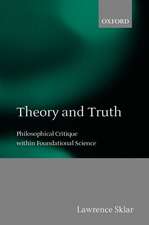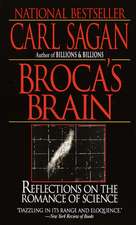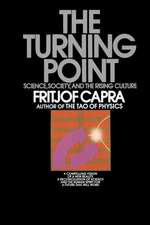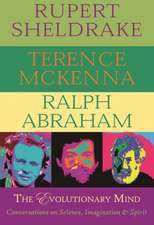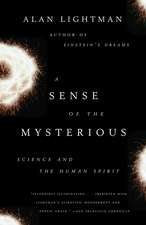Philosophy of Science for Scientists: Springer Undergraduate Texts in Philosophy
Autor Lars-Göran Johanssonen Limba Engleză Hardback – 29 dec 2015
Divided into three parts, the book first examines the question What is Science? It describes the evolution of science, defines knowledge, and explains the use of and need for hypotheses and hypothesis testing. The second half of part I deals with scientific data and observation, qualitative data and methods, and ends with a discussion of theories on the development
of science. Part II offers philosophical reflections on four of the most important concepts in science: causes, explanations, laws and models. Part III presents discussions on philosophy of mind, the relation between mind and body, value-free and value-related science, and reflections on actual trends in science.
| Toate formatele și edițiile | Preț | Express |
|---|---|---|
| Paperback (1) | 453.39 lei 6-8 săpt. | |
| Springer International Publishing – 29 mar 2019 | 453.39 lei 6-8 săpt. | |
| Hardback (1) | 458.57 lei 3-5 săpt. | +25.45 lei 10-14 zile |
| Springer International Publishing – 29 dec 2015 | 458.57 lei 3-5 săpt. | +25.45 lei 10-14 zile |
Preț: 458.57 lei
Preț vechi: 539.49 lei
-15% Nou
Puncte Express: 688
Preț estimativ în valută:
87.75€ • 91.86$ • 72.60£
87.75€ • 91.86$ • 72.60£
Carte disponibilă
Livrare economică 15-29 martie
Livrare express 04-08 martie pentru 35.44 lei
Preluare comenzi: 021 569.72.76
Specificații
ISBN-13: 9783319265490
ISBN-10: 3319265490
Pagini: 257
Ilustrații: XV, 257 p. 28 illus. in color.
Dimensiuni: 155 x 235 x 18 mm
Greutate: 0.56 kg
Ediția:1st ed. 2016
Editura: Springer International Publishing
Colecția Springer
Seria Springer Undergraduate Texts in Philosophy
Locul publicării:Cham, Switzerland
ISBN-10: 3319265490
Pagini: 257
Ilustrații: XV, 257 p. 28 illus. in color.
Dimensiuni: 155 x 235 x 18 mm
Greutate: 0.56 kg
Ediția:1st ed. 2016
Editura: Springer International Publishing
Colecția Springer
Seria Springer Undergraduate Texts in Philosophy
Locul publicării:Cham, Switzerland
Public țintă
Upper undergraduateCuprins
Preface and overview of the bookPart 1: What is science?.- 1. The Evolution of Science.- 2. Knowledge.- 3. Hypotheses and Hypothesis Testing.- 4. On Scientific Data.- 5. Qualitative Data and Methods.- 6. Theories about the Development of Science.- Part 2. Philosophical reflections on four core concepts in science: causes, explanations, laws and models.- 7. On Causes and Correlations.- 8. Explanations.- 9. Explanation in the Humanities and Social Sciences.- 10. Scientific Laws.- 11. Theories, Models and Reality.- Part 3. Some auxiliaries.- 12. The Mind-Body Problem.- 13. Science and Values.- 14. Some trends in science.- Appendix.- Logical Forms.- Index.
Recenzii
“Target audience comprises ‘students of engineering, physics, biology, social science, medicine and nursing’ … this book allows readers from a global audience to grasp the ‘flavour’ of the long and rich Germanic and Scandinavian tradition.” (Agustín Adúriz-Bravo, Science and Education, Vol. 28, 2019)
“The aim of Lars-Göran Johansson’s textbook Philosophy of Science for Scientists is … to provide an introduction to the philosophy of science for students in all fields of science. … the book is supposed to be suitable for an undergraduate level course in the philosophy of science for philosophy students.” (Amanda Thorell, Theoria, Vol. 83, 2017)
“Lars-Göran Johansson’s recent book Philosophy of science for scientists is the only textbook in the philosophy of science that is addressed specifically to an audience consisting of scientists. … In its breadth of treated topics, the book can serve as a basic text to many different courses in the philosophy of science.”(Maarten Franssen, Metascience, Vol. 26, 2017)
“Philosophy of Science for Scientists by Lars-Goran Johansson: a lovely textbook for undergraduates. It is a highly readable introduction to how one can view the practice of science. … this is an excellent introduction to understanding science in a general sense. Students and practitioners will find it worthwhile to read and discuss.” (David S. Mazel, MAA Reviews, maa.org, November, 2016)
“This is an excellent book that can serve as a very appropriate textbook for the first course in Philosophy of Science. … it is a very well written book and is an enjoyable reading. … It is well written by a great authority in the field and I strongly recommend it to you if you are interested in to understand what science is and why science is important for knowledge and our understanding of reality.” (Philosophy, Religion and Science Book Reviews, Bookinspections.wordpress.com, July, 2016)
“The aim of Lars-Göran Johansson’s textbook Philosophy of Science for Scientists is … to provide an introduction to the philosophy of science for students in all fields of science. … the book is supposed to be suitable for an undergraduate level course in the philosophy of science for philosophy students.” (Amanda Thorell, Theoria, Vol. 83, 2017)
“Lars-Göran Johansson’s recent book Philosophy of science for scientists is the only textbook in the philosophy of science that is addressed specifically to an audience consisting of scientists. … In its breadth of treated topics, the book can serve as a basic text to many different courses in the philosophy of science.”(Maarten Franssen, Metascience, Vol. 26, 2017)
“Philosophy of Science for Scientists by Lars-Goran Johansson: a lovely textbook for undergraduates. It is a highly readable introduction to how one can view the practice of science. … this is an excellent introduction to understanding science in a general sense. Students and practitioners will find it worthwhile to read and discuss.” (David S. Mazel, MAA Reviews, maa.org, November, 2016)
“This is an excellent book that can serve as a very appropriate textbook for the first course in Philosophy of Science. … it is a very well written book and is an enjoyable reading. … It is well written by a great authority in the field and I strongly recommend it to you if you are interested in to understand what science is and why science is important for knowledge and our understanding of reality.” (Philosophy, Religion and Science Book Reviews, Bookinspections.wordpress.com, July, 2016)
Notă biografică
Lars-Göran Johansson holds a B.Sc. (mathematics and physics) from University of Gothenburg and a Ph.D in theoretical philosophy from Stockholm University. He is author of three books: Introduktion till vetenskapsteorin, Interpreting Quantum Mechanics. A Realist View in Schrödinger’s Vein and (together with Pauliina Remes, George Masterton and Tomas Ekenberg) Kunskapsteori. En introduktion till vetande, berättigande och sanning. He has also published papers and book chapters on laws of nature, induction, causation, probability and time. Since 2008 he is professor in theoretical philosophy at Uppsala University.
Textul de pe ultima copertă
This textbook offers an introduction to the philosophy of science. It helps undergraduate students from the natural, the human and social sciences to gain an understanding of what science is, how it has developed, what its core traits are, how to distinguish between science and pseudo-science and to discover what a scientific attitude is. It argues against the common assumption that there is fundamental difference between natural and human science, with natural science being concerned with testing hypotheses and discovering natural laws, and the aim of human and some social sciences being to understand the meanings of individual and social group actions. Instead examines the similarities between the sciences and shows how the testing of hypotheses and doing interpretation/hermeneutics are similar activities. The book makes clear that lessons from natural scientists are relevant to students and scholars within the social and human sciences, and vice versa. It teaches its readers howto effectively demarcate between science and pseudo-science and sets criteria for true scientific thinking.
Divided into three parts, the book first examines the question What is Science? It describes the evolution of science, defines knowledge, and explains the use of and need for hypotheses and hypothesis testing. The second half of part I deals with scientific data and observation, qualitative data and methods, and ends with a discussion of theories on the development of science. Part II offers philosophical reflections on four of the most important concepts in science: causes, explanations, laws and models. Part III presents discussions on philosophy of mind, the relation between mind and body, value-free and value-related science, and reflections on actual trends in science.
Divided into three parts, the book first examines the question What is Science? It describes the evolution of science, defines knowledge, and explains the use of and need for hypotheses and hypothesis testing. The second half of part I deals with scientific data and observation, qualitative data and methods, and ends with a discussion of theories on the development of science. Part II offers philosophical reflections on four of the most important concepts in science: causes, explanations, laws and models. Part III presents discussions on philosophy of mind, the relation between mind and body, value-free and value-related science, and reflections on actual trends in science.
Caracteristici
Highly suitable as a textbook for undergraduate Science and Engineering courses Relevant to students in the natural, social and human sciences Advances understanding of what science is and how it developed Includes supplementary material: sn.pub/extras








